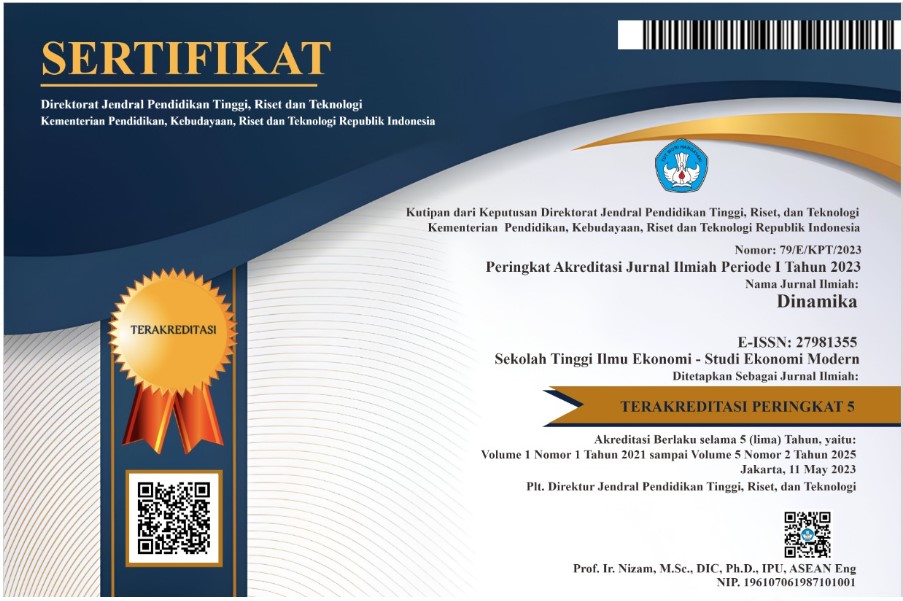PENGARUH KONFLIK, STRESS DAN PERUBAHAN ORGANISASI TERHADAP PRODUKTIVITAS KARYAWAN
DOI:
https://doi.org/10.51903/dinamika.v3i2.400Keywords:
conflict, organizational change, productivity, stress, employees.Abstract
Employee well-being is an important factor in the productivity and success of an organization. Conflict can cause stress, and job dissatisfaction and affect employee welfare. Protracted conflicts or damaging relationships between employees can hinder operational efficiency. There has been much study of the effects of conflict and stress, but not much has been studied about the effect of conflict and stress and organizational change on employee productivity. The purpose of this study is to study the effect of conflict, stress, and organizational change on employee productivity. This research is a survey research with data collection of 300 respondents through questionnaires and interviews. Questions in the survey include the level of conflict experienced, its impact on productivity, and the factors that influence it. There are 3 independent variables, namely conflict, stress, and organizational change. Its dependent variable is productivity. Linear regression or multiple regression is used to identify the extent to which conflict, stress, and organizational change predict productivity. Also used analysis with SEM. The results showed that the level of conflict in the workplace had a significant negative impact on employee productivity. The level of stress experienced by employees is also related to productivity. High stress leads to a decrease in productivity. Organizational change contributes to higher levels of conflict and stress among employees. However, managing change with good communication and management support can reduce the negative impact of change on productivity. This study concludes that good conflict management, stress management, and effective change management can help increase employee productivity in the work environment. The conclusion of this study provides a foundation for actions and policies that support increased employee productivity in the work environment.
References
[2] W. C. Purba and S. L. Ratnasari, ‘Pengaruh Konflik Kerja, Stres Kerja, dan Beban Kerja Terhadap Kinerja Karyawan PT. Mutiara Hutama Sukses’, J. Bening, vol. 5, no. 2, pp. 180–189, 2018.
[3] S. Anastasiou, ‘The significant effect of leadership and conflict management on job satisfaction’, Acad. J. Interdiscip. Stud., vol. 9, no. 6, pp. 9–17, 2020, doi: 10.36941/AJIS-2020-0107.
[4] S. Lu, F. Wei, and G. Li, ‘The evolution of the concept of stress and the framework of the stress system’, Cell Stress, vol. 5, no. 6, pp. 76–85, 2021, doi: 10.15698/CST2021.06.250.
[5] E. Lase, T. S. Hwee, and Y. R. Edward, ‘The Effect of Role Conflict and Ethical Sensitivity on Auditor Performance with Moderation of Emotional Intelligence’, J. Econ. Business, Account. Ventur., vol. 24, no. 2, p. 326, 2021, doi: 10.14414/jebav.v24i2.2743.
[6] W. Ye and M. F. Damian, ‘Effects of conflict in cognitive control: Evidence from mouse tracking’, Q. J. Exp. Psychol., vol. 76, no. 1, pp. 54–69, 2023, doi: 10.1177/17470218221078265.
[7] B. B. Ogharen, E. O. Egbule, and A. C. Joy, ‘Management of Interpersonal Conflict Involving Principals and Teachers of Selected Public Secondary Schools in Nigeria’, J. Educ. Soc. Res., vol. 12, no. 3, pp. 320–336, 2022, doi: 10.36941/jesr-2022-0090.
[8] Y. Long et al., ‘Interpersonal conflict increases interpersonal neural synchronization in romantic couples’, Cereb. Cortex, vol. 32, no. 15, pp. 3254–3268, 2022, doi: 10.1093/cercor/bhab413.
[9] M. Isa and N. Indrayati, ‘The role of work–life balance as mediation of the effect of work–family conflict on employee performance’, SA J. Hum. Resour. Manag., vol. 21, pp. 1–10, 2023, doi: 10.4102/sajhrm.v21i0.1910.
[10] Y. Susilo and W. Wahyudin, ‘Pengaruh Konflik Kerja Dan Stres Kerja Terhadap Kinerja Pegawai Dinas Pertanian Kota Surabaya’, EKOMABIS J. Ekon. Manaj. Bisnis, vol. 1, no. 01, pp. 45–58, 2020.
[11] B. Chen, L. Wang, B. Li, and W. Liu, ‘Work stress, mental health, and employee performance’, Front. Psychol., vol. 13, 2022, doi: 10.3389/fpsyg.2022.1006580.
[12] Dedi Iskamto, ‘Stress and Its Impact on Employee Performance’, Int. J. Soc. Manag. Stud., vol. 03, no. 02, pp. 142–148, 2021.
[13] K. Karim, ‘The Effect of Work Stress on Employee Performance’, Asean Int. J. Bus., vol. 1, no. 1, pp. 24–33, 2022, doi: 10.54099/aijb.v1i1.68.
[14] Setyanto Putro and Nur Wening, ‘the Effect of Work Stress on Employee Performance With Emotional Intelligence As a Moderating Variable’, Int. J. Innov. Technol. Soc. Sci., no. 3(35), pp. 0–11, 2022, doi: 10.31435/rsglobal_ijitss/30092022/7851.
[15] F. Farid, A. Rahman, C. Raehani, and D. Febrianti, ‘Dinamika Kekuasaan dalam Perubahan Organisasi’, J. Sinar Manaj., vol. 7, no. 2, pp. 88–94, 2020, doi: 10.56338/jsm.v7i2.1228.
[16] S. Saepudin, D. A. Kodir, F. Fatimatuzzahroh, S. Sukarna, and M. Mashuri, ‘Memahami Peran Pemimpin sebagai Agen Perubahan’, J. Syntax Admiration, vol. 4, no. 1, pp. 84–98, 2023, doi: 10.46799/jsa.v4i1.509.
[17] P. U. W. Putro, ‘Etika Kerja Islam, Komitmen Organisasi, Sikap Pada Perubahan Organisasi Terhadap Kinerja’, J. Manaj. Indones., vol. 18, no. 2, p. 116, 2018, doi: 10.25124/jmi.v18i2.1205.
[18] V. Ariany, N. Y. Naipospos, I. S. Tanjung, and S. Sariyanto, ‘Analisis Pengaruh Konflik Peran Ganda Dan Dukungan Sosial Terhadap Komitmen Organisasi Pada Wanita Karier Di Kantor Gubernur Sumatera Utara’, Jesya, vol. 5, no. 2, pp. 2345–2353, 2022, doi: 10.36778/jesya.v5i2.851.
[19] P. A. Ilham and I. G. S. Putra, ‘Pengaruh Konflik Kerja, Stres Kerja dan Kinerja Karyawan Terhadap Kinerja Karyawan Hotel Grandia Bandung’, J. Ekon. Ef., vol. 4, no. 4, p. 586, 2022, doi: 10.32493/jee.v4i4.22026.
[20] J. Imam and B. No, ‘2275-6327-1-Pb-1’, vol. 2, no. 2, pp. 92–100, 2017.
[21] M. Muis, M. F. Nai’em, A. A. Arsin, A. M. Darwis, Y. Thamrin, and N. A. P. Hans, ‘The effect of multiple role conflicts and work stress on the work performance of female employees’, Gac. Sanit., vol. 35, no. 2018, pp. S90–S93, 2021, doi: 10.1016/j.gaceta.2020.12.025.
[22] K. Alimuddin, ‘Pengaruh Konflik Kerja’, Ятыатат, vol. вы12у, no. 235. p. 245, 2020, [Online]. Available: http://digilib.unila.ac.id/4949/15/BAB II.pdf.
[23] RADHIANA, S. AMRI, and D. M. PUTRA, ‘Pengaruh Konflik Kerja Terhadap Kinerja Pegawai Pada Dinas Pemuda Dan Olahraga Kota Banda Aceh’, JEMSI (Jurnal Ekon. Manajemen, dan Akuntansi), vol. 8, no. 1, pp. 17–33, 2022, doi: 10.35870/jemsi.v8i1.641.
[24] S. Suwanto, K. Kosasih, N. Nurjaya, D. Sunarsi, and H. Erlangga, ‘Pengaruh Motivasi Dan Pengalaman Kerja Terhadap Produktivitas Karyawan Pada Happy Restaurant Di Bandung’, J. Ekon. Ef., vol. 3, no. 4, p. 546, 2021, doi: 10.32493/jee.v3i4.11292.
[25] S. Sukardi, ‘Pengaruh Motivasi dan Disiplin Kerja Terhadap Produktivitas Karyawan Pada PT Capital Life Indonesia di Jakarta’, J. Econ. Manag. Account. Technol., vol. 4, no. 1, pp. 29–42, 2021, doi: 10.32500/jematech.v4i1.1445.
[26] Firmansyah, ‘Pengaruh Kompensasi, Disiplin Kerja, Dan Motivasi Terhadap Produktivitas Karyawan’, Perspektif, vol. 1, no. 3, pp. 231–236, 2022, doi: 10.53947/perspekt.v1i3.194.
[27] P. K. Karyawan, F. Ekonomi, U. M. Palopo, and K. Kunci, ‘1761 Sekolah Tinggi Ilmu Ekonomi (STIE) Al-Washliyah Sibolga’, vol. 6, no. 2, pp. 1761–1771, 2023.
[28] N. A. A. Abdelwahed and M. A. A. Doghan, ‘Developing Employee Productivity and Performance through Work Engagement and Organizational Factors in an Educational Society’, Societies, vol. 13, no. 3, 2023, doi: 10.3390/soc13030065.
[29] Christopher S. Goldenstein, et. al. “Infrared laser-absorption sensing for combustion gases.” Progress in Energy and Combustion Science, Volume 60, May 2017, Pages 132-176, https://doi.org/10.1016/j.pecs.2016.12.002.












